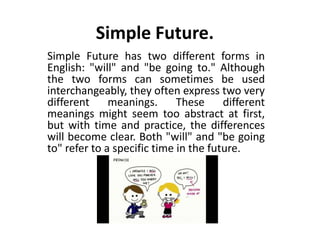Simple future
- 1. Simple Future. Simple Future has two different forms in English: "will" and "be going to." Although the two forms can sometimes be used interchangeably, they often express two very different meanings. These different meanings might seem too abstract at first, but with time and practice, the differences will become clear. Both "will" and "be going to" refer to a specific time in the future.
- 2. Affirmative Sentences This is the structure used. âĒ Subject + âwillâ + principal verb. Examples: I will [Iâll] call you tonight. She will [Sheâll] arrive late. They will [Theyâll] be happy to see you.
- 3. Negative Sentences âĒ Subject + âwillâ + ânotâ + principal verb âĒ Examples: I will not [wonât] call you tonight. She will not [wonât] arrive late. They will not [wonât] be happy to see you.
- 4. Interrogative Sentences âĒ âWillâ + subject + principal verb. âĒ Examples: Will you call me tonight? ( Will she arrive late? Will they be happy to see you?
- 6. Will" to Express a Voluntary Action âĒ "Will" often suggests that a speaker will do something voluntarily. Often, we use "will" to respond to someone else's complaint or request for help. Similarly, we use "will not" or "won't" when we refuse to voluntarily do something.
- 7. Examples âĒ I will send you the information when I get it. âĒ I will translate the email, so Mr. Smith can read it. âĒ Will you help me move this heavy table? âĒ Will you make dinner? âĒ I will not do your homework for you. âĒ I won't do all the housework myself! âĒ A: I'm really hungry. B: I'll make some sandwiches. âĒ A: I'm so tired. I'm about to fall asleep. B: I'll get you some coffee. âĒ A: The phone is ringing. B: I'll get it.
- 8. Will" to Express a Promise âĒ "Will" is usually used in promises. âĒ Examples: âĒ I will call you when I arrive. âĒ If I am elected President of the United States, I will make sure everyone has access to inexpensive health insurance. âĒ I promise I will not tell him about the surprise party. âĒ Don't worry, I'll be careful. âĒ I won't tell anyone your secret.
- 9. "Will" or "Be Going to" to Express a Prediction âĒ Both "will" and "be going to" can express the idea of a general prediction about the future. Predictions are guesses about what might happen in the future. In "prediction" sentences, the subject usually has little control over the future and therefore USES 1-3 do not apply. In the following examples, there is no difference in meaning.
- 10. âĒ Examples: âĒ The year 2017 will be a very interesting year. âĒ The year 2018 is going to be a very interesting year. âĒ John Smith will be the next President. âĒ John Smith is going to be the next President. âĒ The movie "Zenith" will win several Academy Awards. âĒ The movie "Zenith" is going to win several Academy Awards

![Affirmative Sentences
This is the structure used.
âĒ Subject + âwillâ + principal verb.
Examples:
I will [Iâll] call you tonight.
She will [Sheâll] arrive late.
They will [Theyâll] be happy to see you.](https://image.slidesharecdn.com/simplefuture-160309045931/85/Simple-future-2-320.jpg)
![Negative Sentences
âĒ Subject + âwillâ + ânotâ + principal verb
âĒ Examples:
I will not [wonât] call you tonight.
She will not [wonât] arrive late.
They will not [wonât] be happy to see you.](https://image.slidesharecdn.com/simplefuture-160309045931/85/Simple-future-3-320.jpg)







